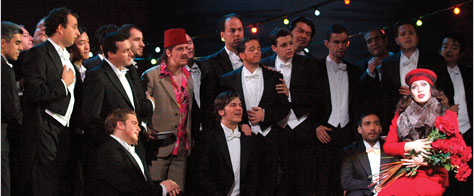Another bubbly bel canto bon bon is playing at LA Opera right now in the form of Il Turco in Italia, a lesser-known Rossini opera that deserves wider renown. Those seeking fresh opera fare should note that this is the debut performance of this work by the company, although this production by German director Christof Loy has already made its way through a number of European opera houses. While not a lavish production, either in terms of big-name stars or production design, it manages to entertain throughout, thanks to solid singing, a lively libretto and Rossini’s effervescent score.
Only 22 when he wrote Il Turco in 1814, Rossini was following up his popular La Italiana in Algeri. It was a time when Orientalism was in vogue and audiences lapped up stories about the exotic Mohammedans who were frequently stereotyped as sensual and seductive by nature. But Il Turco never achieved the lasting popularity of his previous opera, and it played infrequently until a final performance in 1847, after which it was forgotten for over 100 years. In 1958, the opera was revived and it has been growing in popularity since. With its shifting perspectives about art, love and identity, it’s a bit like walking into a room full of funhouse mirrors. This abstractness helps lend the work a distinctly modern sensibility, while its sex-farce underpinnings keep things humming.
The two-act opera opens with an extended overture — all lightness and frivolity — as we gaze upon a small gypsy caravan, in this case a compact camper trailer that, in clown-car style, soon disgorges a multitude of players. Included among them is Zaida, a refugee harem girl rejected by her beloved Selim, a Turkish prince. Macho Selim coincidentally arrives at the same Italian shore — floating in on a flying carpet — in search of amorous adventures. He meets Fiorilla, a flirtatious wife grown bored with her blustering buffoon of a husband, Don Geronio, as well as her over-earnest lover, Don Narciso. She and Selim feel instant attraction and spend most of the opera negotiating their romance, while Zaida and the cuckolded men provide the ensuing complications. Throughout, the local poet, Prosdocino, both observes and incites the action in order to compose his latest comedy, providing a sort of meta-opera that comments on its own plotline as it evolves.
The production design relies on the now common ploy of a vaguely 1950s-era setting to give a whiff of modernity yet still seem apart from our time. The simple, spare sets are lackluster — one gets the sense of cost economy — and I found myself fantasizing about how entertaining it would be to see this in an original “period” staging replete with ocelot skins, striped silk tents and luxury barges. Certain other staging devices, meant to be innovative and modern, just didn’t work: these include the chorus appearing as stagehands in LA Opera T-shirts, as well as a series of clothing racks that descend from above so that characters can change costumes as we watch. Yes, we get that we are seeing Prosdocino’s play take shape parallel with the action, but there must be a more elegant way to depict this. Likewise, we are presumably meant to be shocked by the men appearing in drag and the women in poses of ravishment in the big costume ball scene in the second act. But the dance is silly and the spectacle is ultimately about as titillating as a laddie-mag cover.
The orchestra and the singers had no such interpretive problems. Georgian soprano Nino Machaidze, who seemed unremarkable in last season’s Elixir of Love, really impresses here. Her voice pierces the theater with an intriguing dark tonality, and her acting keeps your attention riveted. The two bassos, Simone Alberghini as Selim and Paolo Giovanelli as Don Geronio, are also a pleasure to hear and to see, one with a commanding macho persona, the other haughty and comic. Kate Lindsey as Zaida has a pleasant voice, but unfortunately lacks presence. Those who like ensemble singing will be pleased as Il Turco features a lot of it; few could fail to be impressed by the ricocheting six-part harmony we are treated to for the waltz at the end of Act I.
Il Turco in Italia is opera as everyone would wish it to be — funny, dramatic and entertaining with beautiful music and a happy ending. Kind of like life? Hardly, but that’s the point… it could be the perfect tonic for what ails you in these contentious times.
There are five more performances through March 13. Visit www.laopera.com.






